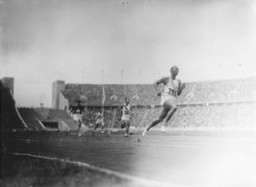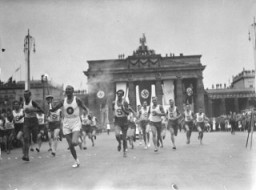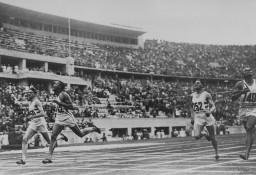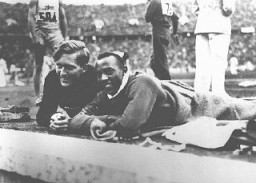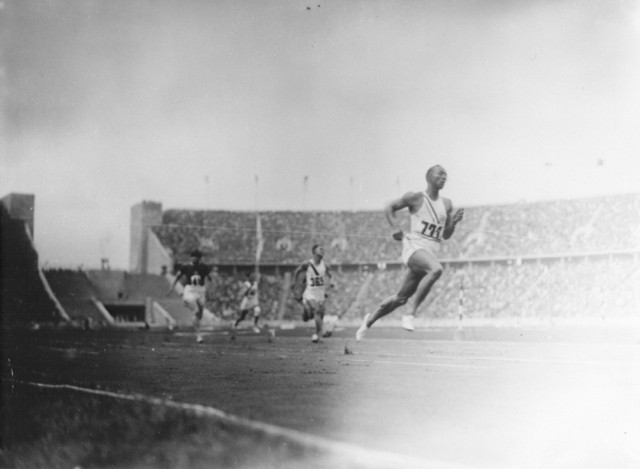
The Nazi Olympics Berlin 1936
The 1936 Berlin Olympic Games were more than just a worldwide sporting event, they were a show of Nazi propaganda, stirring significant conflict. Despite the exclusionary principles of the 1936 Games, countries around the world still agreed to participate.
-
1
Nazi Germany used the 1936 Olympic Games for propaganda purposes. The Nazis promoted an image of a new, strong, and united Germany while masking the regime’s targeting of Jews and Roma (Gypsies) as well as Germany’s growing militarism.
-
2
For the first time in the history of the modern Olympic Games, people in the United States and Europe called for a boycott of the Olympics because of what would later become known as human rights abuses. Although the movement ultimately failed, it set an important precedent for future Olympic boycott campaigns (such as those in 2008 and 2014).
-
3
Once the boycott movement narrowly failed, Germany had its propaganda coup: the 49 nations who sent teams to the Games legitimized the Hitler regime both in the eyes of the world and of German domestic audiences.
Introduction
For two weeks in August 1936, Adolf Hitler's Nazi dictatorship camouflaged its racist, militaristic character while hosting the Summer Olympics. Softpedaling its antisemitic agenda and plans for territorial expansion, the regime exploited the Games to bedazzle many foreign spectators and journalists with an image of a peaceful, tolerant Germany.
Having rejected a proposed boycott of the 1936 Olympics, the sponsoring athletic and Olympic organizations of the United States and other western democracies missed the opportunity to take a stand that—some observers at the time claimed—might have given Hitler pause and bolstered international resistance to Nazi tyranny.
With the conclusion of the Games, Germany's expansionist policies and the persecution of Jews and other "enemies of the state" accelerated, culminating in World War II and the Holocaust.
The 1936 Summer Olympic Games
In 1931, the International Olympic Committee awarded the 1936 Summer Olympics to Berlin. The choice signaled Germany's return to the world community after its isolation in the aftermath of defeat in World War I.
Two years later, Nazi Party leader Adolf Hitler became chancellor of Germany and quickly turned the nation's fragile democracy into a one-party dictatorship that persecuted Jews, Roma (Gypsies), all political opponents, and others. The Nazi claim to control all aspects of German life also extended to sports.
German sports imagery of the 1930s served to promote the myth of “Aryan” racial superiority and physical prowess. In sculpture and in other forms, German artists idealized athletes' well-developed muscle tone and heroic strength and accentuated ostensibly Aryan facial features. Such imagery also reflected the importance the Nazi regime placed on physical fitness, a prerequisite for military service.
Exclusion from German Sports
In April 1933, an "Aryans only" policy was instituted in all German athletic organizations. "Non-Aryans"—Jews or individuals with Jewish parents and Roma (Gypsies)—were systematically excluded from German sports facilities and associations. The German Boxing Association expelled professional light heavyweight champion Erich Seelig in April 1933 because he was Jewish. (Seelig later resumed his boxing career in the United States.) Another Jewish athlete, Daniel Prenn—Germany's top-ranked tennis player—was removed from Germany's Davis Cup Team. Gretel Bergmann, a world-class high jumper, was expelled from her German club in 1933 and excluded from the German Olympic team in 1936.
Jewish athletes barred from German sports clubs flocked to separate Jewish associations, including the Maccabee and Shield groups, and to improvised segregated facilities. But these Jewish sports facilities were not comparable to well-funded German groups. Roma (Gypsies), including the Sinti boxer Johann Rukelie Trollmann, were also excluded from German sports.

Jewish Athletes
As a token gesture to placate international opinion, German authorities allowed the star fencer Helene Mayer to represent Germany at the Olympic Games in Berlin. Mayer was viewed as a “non-Aryan” because her father was Jewish. She won a silver medal in women's individual fencing and, like all other medalists for Germany, gave the Nazi salute on the podium. No other Jewish athlete competed for Germany in the Summer Games.
Still, nine athletes who were Jewish or of Jewish parentage won medals in the Nazi Olympics, including Mayer and five Hungarians. Seven Jewish male athletes from the United States went to Berlin. Like some of the European Jewish competitors at the Olympics, many of these young men were pressured by Jewish organizations to boycott the Games. These athletes chose to compete for a variety of reasons. Most did not fully grasp at the time the extent and purpose of Nazi persecution of Jews and other groups.
In August 1936, the Nazi regime tried to camouflage its violent racist policies while it hosted the Summer Olympics. Most anti-Jewish signs were temporarily removed and newspapers toned down their harsh rhetoric, in line with directives from the Propaganda Ministry, headed by Joseph Goebbels. Thus, the regime exploited the Olympic Games to present foreign spectators and journalists with a false image of a peaceful, tolerant Germany.
Boycott Movements
Movements to boycott the 1936 Berlin Olympics surfaced in the United States, Great Britain, France, Sweden, Czechoslovakia, and the Netherlands. Debate over participation in the 1936 Olympics was most intense in the United States, which traditionally sent one of the largest teams to the Games. Some boycott proponents supported counter-Olympics. One of the largest was the "People's Olympiad" planned for the summer of 1936 in Barcelona, Spain. It was canceled after the outbreak of the Spanish Civil War in July 1936, just as thousands of athletes had begun to arrive.
Individual Jewish athletes from a number of countries also chose to boycott the Berlin Olympics or Olympic qualifying trials. In the United States, some Jewish athletes and Jewish organizations such as the American Jewish Congress and the Jewish Labor Committee supported a boycott, as did a number of liberal Catholic politicians and many college presidents. However, once the Amateur Athletic Union of the United States opted in a close vote to participate in December 1935, other countries fell in line and the boycott movement failed.
Preparation for the Games
The Nazis made elaborate preparations for the August 1–16 Summer Games. A huge sports complex was constructed, including a new stadium and state-of-the art Olympic village for housing the athletes. Olympic flags and swastikas bedecked the monuments and houses of a festive, crowded Berlin.
Most tourists were unaware that the Nazi regime had temporarily removed anti-Jewish signs, nor did they know of a police roundup of Roma in Berlin, ordered by the German Ministry of the Interior. On July 16, 1936, some 800 Roma residing in Berlin and its environs were arrested and interned under police guard in a special camp in the Berlin suburb of Marzahn.
Nazi officials also ordered that foreign visitors should not be subjected to the criminal penalties of Paragraph 175, a German statute that criminalized sexual relations between men.
Opening of the Games
On August 1, 1936, Hitler opened the XIth Olympiad. Musical fanfares directed by the famous composer Richard Strauss announced the dictator's arrival to the largely German crowd. Hundreds of athletes in opening day regalia marched into the stadium, team by team in alphabetical order. Inaugurating a new Olympic ritual, a lone runner arrived bearing a torch carried by relay from the site of the ancient Games in Olympia, Greece.
Forty-nine athletic teams from around the world competed in the Berlin Olympics, more than in any previous Olympics. Germany fielded the largest team with 348 athletes. The US team was the second largest, with 312 members, including 18 African Americans. American Olympic Committee President Avery Brundage led the delegation. The Soviet Union did not participate in the Berlin Games (or any Olympics until the 1952 Helsinki Games, when many politicians, journalists, and competitors regarded the Olympics as an important battle in the Cold War).
Propaganda
Germany skillfully promoted the Olympics with colorful posters and magazine spreads. Athletic imagery drew a link between Nazi Germany and ancient Greece, symbolizing the Nazi racial myth that a superior German civilization was the rightful heir of an "Aryan" culture of classical antiquity. This vision of classical antiquity emphasized ideal "Aryan" racial types: heroic, blue-eyed blonds with finely chiseled features.
Concerted propaganda efforts continued well after the Olympics with the international release in 1938 of Olympia, the controversial documentary directed by German filmmaker Leni Riefenstahl. Renowned for her earlier propaganda film, Triumph of the Will (1934) depicting Nazi Party rallies at Nuremberg, Riefenstahl was commissioned by the Nazi regime to produce this film about the 1936 Summer Games.
German Victories
Germany emerged victorious from the XIth Olympiad. German athletes captured the most medals, and German hospitality and organization won the praises of visitors. Most newspaper accounts echoed the New York Times report that the Games put Germany "back in the fold of nations," and even made the Germans "more human again." Some even found reason to hope that this peaceable interlude would endure. Only a few reporters, such as the American William Shirer, understood that the Berlin glitter was merely a facade hiding a racist and violently oppressive regime.
After the Games
As post-Games reports were filed, Hitler pressed on with grandiose plans for German expansion. Persecution of Jews resumed. Two days after the Olympics, Captain Wolfgang Fuerstner, head of the Olympic village, killed himself when he was dismissed from military service because of his Jewish ancestry.
Germany invaded Poland on September 1, 1939. Within just three years of the Olympiad, the "hospitable" and "peaceable" sponsor of the Games unleashed World War II, a conflict that resulted in untold destruction. With the conclusion of the Games, Germany's expansionist policies and the persecution of Jews and other "enemies of the state" accelerated, culminating in the Holocaust.
Critical Thinking Questions
- What political purposes might be served by hosting the Olympics?
- Since 1945, when have Olympics events or participation been affected by political beliefs or actions?
